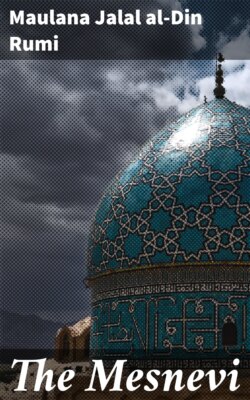Читать книгу The Mesnevi - Maulana Jalal al-Din Rumi - Страница 37
На сайте Литреса книга снята с продажи.
16.
ОглавлениеIt was related by one of the chief of Jelāl’s disciples, a butcher by trade, a trainer of dogs for the chase, and a purveyor of horses of the best kind, which he used to sell to princes and grandees at high prices, that, at a certain time, Jelāl was much exercised by visions from the spiritual world, so that for forty days he was as though beside himself, passing through the streets with his head bare, and his turban twisted round his neck.
After that, he came suddenly one day, bathed in perspiration, to the butcher, and said he wanted a certain unbroken horse to be saddled for him immediately. The butcher, with the help of three stable-men, managed with the utmost difficulty to saddle the horse and bring him out. Jelāl mounted him without opposition, and set off in a southerly direction. The butcher asked whether he should accompany him, and Jelāl replied: “Give me your prayers and holy good wishes.”
In the evening Jelāl returned covered with dust. The poor horse, though of gigantic frame, was reduced to mere skin and bone, being nearly broken-backed with fatigue.
The next day he came again, and asked for another horse, better than the one of yesterday, mounted it, and rode off. He returned at the hour of sunset devotions, and this horse also was reduced to a pitiable condition. The butcher dared not offer a word of remonstrance.
On the third day he came again, mounted a third horse, and returned as before, at sunset. He sat down now in the most composed manner possible, and called out cheerily: “Good news! Glad tidings, O ye of the Faith! That dog of hell has gone back to his pit of fire!”
The butcher was too much astonished at his manner to feel any inclination to inquire what these words might mean; but a certain number of days afterwards, a large caravan came into Qonya from Syria, and brought news that the Mogul army had besieged Damascus, and had reduced it to straits.
Helaw Khan (Holagu, Helagu) had taken Bagdad in A.H. 655 (A.D. 1257-58). Two years later, A.H. 657 (A.D. 1259-60), he advanced against Aleppo and Syria, sending his general, Ketbuga, against Damascus with a numerous army. He laid siege to the city. But the inhabitants witnessed, with their very own eyes, that Jelāl came and joined himself there to the forces of Islām. He inflicted defeat on the Mogul forces, who were compelled to retreat, totally frustrated.
The butcher was overjoyed at this welcome intelligence, and went forthwith to communicate the news to Jelāl. The latter smilingly replied: “Yes, yes! Jelālu-’d-Dīn was the horseman who obtained a victory over the enemy, and showed himself a Sultan in the eyes of the people of Islām.” On hearing this, his disciples rent the air with their shouts of joy and triumph, and the townspeople of Qonya decked out and illuminated the city, holding public rejoicings.
This miracle of power became noised abroad, and everywhere Jelāl’s friends and adherents were transported with ecstasy at its occurrence.
